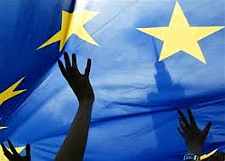Stating the volume of trade between India and Finland is "not big enough", Finnish Minister for Foreign Trade Alexander Stubb today said it would increase only after signing of the much-talked about free trade agreement between India and European Union. He blamed the bureaucratic obstacle for the delay in signing of the agreement.
He blamed the bureaucratic obstacle for the delay in signing of the agreement.
Stubb, who is also Finland´s Minister For European Affairs, admitted that European Union and the United States "have not always been fair" towards the emerging economies on acquiring latest technologies in the field of cleantech, which is essential in dealing with the issues of climate change.
"The volume of trade between India and Finland is not big enough. Most important is the free trade agreement between India and EU. Because after that (we can) increase trade.
We have been actually pushing for free trade agreement for long time," he told a group of visiting Indian journalists in Helsinki.
Asked about the roadblock to free trade agreement, the minister said "I think there may be special interests of member states. There are some issues.
"Some are in automotive industries and some in services. It is a typical bureaucratic obstacle to come up with different kinds of impediments to free trade and of course, there are issues
It takes two to tango," the Minister said.
He said Finland has substantial investments in India and his country has done a lot of work especially in clean tech sectors and in the ICT sectors.
In 2011, imports from India to Finland stood at 670 million euro and exports to India stood at 625 million euro, he said.
"But symbolically I think, if we can come up with a full fledged trade agreement in the WTO, which unfortunately doesn't seem very likely, it is very important that the EU establishes bilateral trade agreements with countries such as India, Japan and South Korea," he said.
He said the Finland's business houses do not consider India and China as cheap labour markets but as a large consumer goods market to sell their products in future.
The emerging economies are growing fast. We have to keep this in mind while planning our future economic strategy,'' he said.
When asked about the high cost in getting clean technology, he said, "I think I understand you.
The EU, the US have not always been fair traders. Their game hasn't always been fair.
In my previous position as Foreign Minister I was calling for what I call a dignified foreign policy. Why not...even calling dignified trade policy.
"Greener economy is the future and I see developing countries evolving in that direction too," he said.








